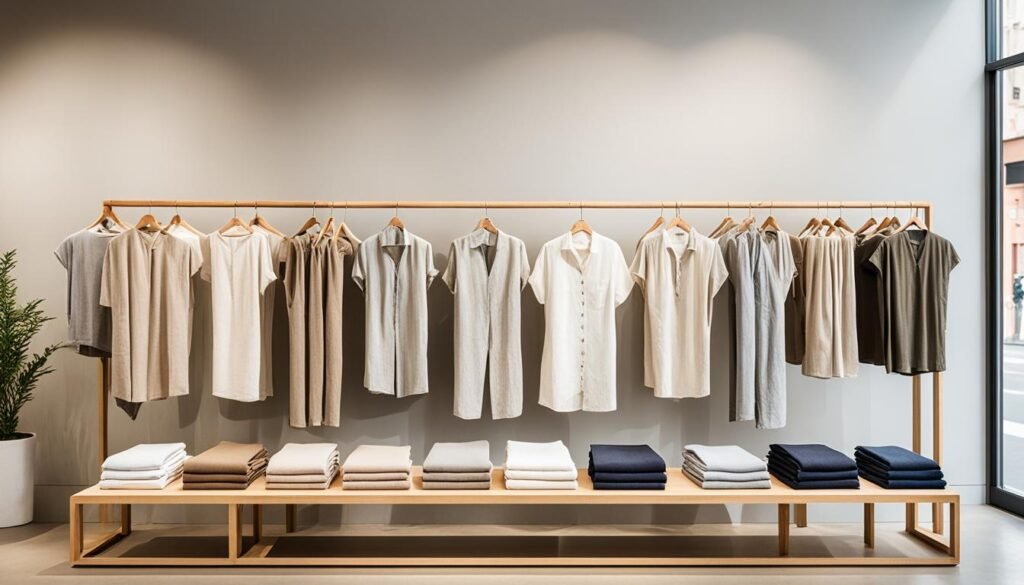Your cart is currently empty!

Eco-Friendly Linen Style: Sustainable & Ethical Fashion
Amidst the rising tide of sustainable fashion, the timeless allure of linen stands out. Revered for its array of linen fabric benefits, this natural textile embodies an eco-friendly wardrobe choice that merges sartorial elegance with environmental consciousness. The essence of ethical linen clothing lies in its roots – the flax plant, requiring minimal water and resistant to pests, thus minimizing harmful agricultural interventions.
When one opts for organic linen, they champion an even more ethical fashion ethos by eschewing pesticides, further bolstering the material’s biodegradability. Esteemed certifications like Oeko-Tex and European Flax assure consumers of meticulous production standards, consolidating linen’s reputation as an ideal fabric for warmer climes or as a staple in any year-round collection. Pioneering this commitment is Linen Handmade Studio, which utilizes high-quality European linen, holding the coveted OEKO-TEX standard, exemplifying responsible sourcing and manufacturing, pivotal in modern-day ethical apparel.
Key Takeaways
- Linen’s sustainability is owed to the flax plant’s low water needs and natural pest resistance.
- Organic linen further reduces environmental impact by avoiding pesticides and chemicals.
- Certifications like Oeko-Tex and European Flax signal high ethical and ecological production standards.
- Linen clothing offers benefits such as breathability and moisture-wicking for year-round comfort.
- Brands such as Linen Handmade Studio prioritize eco-friendly practice by using certified European linen.
- Biodegradable textiles like linen are central to the future of environmentally responsible fashion.
The Enduring Appeal of Linen in Sustainable Fashion
The quintessential choice for a sustainable wardrobe, linen—derived from the flax plant—has earned its place as a staple in eco-conscious closets. Through a rich history and solid environmental credentials, linen’s legacy as a durable natural fabric weaves together ancient roots with cutting-edge sustainability practices. In this section, we explore the multifaceted dimensions of linen, celebrating its role as a long-lasting textile with deeply etched cultural significance.
Understanding Linen’s Eco-Friendly Credentials
Grounded in the minimal requirements of the flax plant, linen’s sustainability story begins in the field. The flax plant’s resilience to pests and low thirst for water translates to higher sustainability, positioning flax plant sustainability as an integral chapter in the annals of eco-friendly materials. Consequently, organic linen sets the bar even higher, promoting an agriculture that shuns synthetic additions, enabling the fabric to return to the earth as biodegradable materials. In a market growing increasingly conscious, certifications such as Oeko-Tex and European Flax guarantee conscientious consumers a product free from harmful chemicals—a genuine embodiment of chemical-free textiles.
The Durability and Versatility of Linen Fabric
Outpacing its counterparts in longevity, linen provides a durable natural fabric option that harmonizes strength with softness. Its natural resilience ensures that the environmental impact of linen remains low over time, offering a prototype for long-lasting textiles. Moreover, linen’s heat-regulating capabilities lend it a versatility that adapts seamlessly to varying climates, reinforcing its status as a versatile clothing material. Echoing this durability, brands like Beaumont Organic tap into traditional linen production methods to ensure each garment is crafted for endurance.
Linen Through the Ages: A Historical Perspective
Bearing a historical significance that stretches back to the pharaohs, ancient textile linen was a preferred choice for clothing in hot, demanding environments. The journey from the past lays a path to the period when Belfast earned the moniker Linenopolis, signifying its central role in the linen industry. While its application has evolved beyond its initial domestic sphere, linen continues to bear the torch of its cultural heritage, while embracing innovations that align with contemporary sustainability values.
| Era | Significance | Innovation |
|---|---|---|
| Ancient Egypt | Linen valued for cooling properties in arid climates | Initial refining of linen cultivation and weaving |
| 18th Century Europe | Rise of linen production, leading to the nickname Linenopolis for Belfast | Advancement in linen manufacturing techniques |
| Modern Day | Sustainability championed through organic farming and ethical production methods | Certifications like Oeko-Tex and European Flax validating environmental credentials |
Sustainable and Ethical Linen Fashion
In the vanguard of ethical fashion brands, linen has emerged as a champion of conscious consumerism. This venerable textile, with its humble agricultural roots and minimal ecological footprint, has been seamlessly embraced by contemporary creators of sustainable linen clothing. Such brands exemplify the principles of ethical production, crafting not only garments but also a narrative of stewardship for an environmentally conscious wardrobe.
Among the pantheon of progressive labels is Eileen Fisher, a brand that has become synonymous with sustainability. Its ‘Responsible by Design’ philosophy underscores the fashion house’s dedication to positive environmental and social impact. Eileen Fisher prides itself on using organic linen, ensuring that each piece supports both a greener planet and fair labor practices. Efforts such as these highlight the essential interconnection between human and ecological well-being within the ethos of sustainability.
Conversely, Two Days Off employs a different, yet equally significant, eco-friendly tactic: repurposing deadstock materials for their zero-waste production line. This innovative approach not only reduces waste but also encourages a circular economy, where the lifespan of textiles is significantly extended. As more consumers align their purchases with such ethical considerations, the reverberations are felt across the industry, driving greater adoption of environmental responsibility.
In serving the niche of petite eco-conscious shoppers, Lovanie offers a unique proposition with its array of clothing meticulously tailored from 100% linen or cotton. Representing the intersection of ethical craftsmanship and custom-sized fashion, Lovanie’s offerings cater to those who seek both ethical integrity and a perfect fit. Similarly, Malaika New York has carved out its space with zero-waste designs, melding creativity with sustainability by using certified fabrics such as organic linen.

- Emphasis on sustainable labels reflects a growing trend towards eco-conscious apparel
- Brands like Eileen Fisher and Lovanie show how fashion intersects with ethical enterprise
- Two Days Off’s innovative use of deadstock illustrates the potential of circular fashion
- Malaika New York’s zero-waste and organic fabric utilization sets a precedent for future fashion
In the pursuit of an eco-friendly fashion future, striking a chord between creativity, commerce, and conservation encapsulates the crux of modern ethical fashion. Through the lens of these forward-thinking brands, the evolving relationship between consumers and their wardrobe choices is measurably more attuned to the imperatives of sustainability. As these progressive brands continue to pave the way, they offer an inspiring blueprint for the industry at large—a paradigm where elegance and ethicality are inseparable.
| Brand | Eco-friendly Approach | Material Used |
|---|---|---|
| Eileen Fisher | Organic Linen, Positive Environmental & Social Impact | Organic Linen |
| Two Days Off | Repurposing Deadstock, Zero-Waste Production | Deadstock Materials |
| Lovanie | Custom-sized Ethical Craftsmanship | Linen / Cotton |
| Malaika New York | Zero-Waste Design, Certified Organic Fabrics | Organic Linen |
Conclusion
As the world leans into an era marked by sustainability in fashion, the resurgence and renaissance of linen elucidate a collective awakening to eco-conscious wardrobe decisions. This natural fabric’s deep-seated roots in history and its flourishing within the contemporary fashion milieu underscore the potential for environmentally responsible shopping. By choosing sustainable fabrics like linen, consumers articulate a narrative of thoughtfulness—a testament to their role as custodians of the earth.
Embracing Eco-Conscious Fashion Choices
The ascent of linen, with its minimal environmental footprint, heralds the importance of making discerning fashion choices. It is a representation of a broader movement, a call to arms for consumers to invest in textiles that mirror their ecological and ethical convictions. By preferring materials that synergize with the planet’s rhythms, individuals directly impact the sustainability trends in the fashion industry, propelling it towards greener horizons. The endorsement of linen, particularly from brands that pair quality with conscience, not only enriches one’s personal style but also fortifies the momentum towards future of sustainable fashion.
The Future of Sustainable Fabrics in the Fashion Industry
In anticipation of what lies ahead, it becomes increasingly evident that the fashion industry stands on the precipice of a revolution—a transformation charged by innovation in textiles and powered by the burgeoning demand for next-generation fabrics. The trajectory of linen is emblematic of this progress, a beacon illuminating the passage towards an epoch where every thread, dye, and weave is chosen with purpose, respect, and foresight. Quintessentially, as stewards of this paradigmatic shift, today’s choices lay the foundation for a timeless legacy of environmental stewardship—one stitch at a time.
FAQ
What makes linen an eco-friendly option for sustainable fashion?
Linen is an eco-friendly textile derived from the flax plant, which requires minimal water to grow and is naturally resistant to pests. This reduces the need for harsh agricultural chemicals. When produced organically, linen omits synthetic pesticides and harmful dyes, leading to a textile that biodegrades more easily, lessening its environmental footprint.
Are there certifications I should look for when purchasing linen products?
Yes, certifications such as Oeko-Tex and European Flax signify that the linen has met stringent ecological and social criteria during its production. These certifications enhance consumer trust in the product, ensuring that it aligns with higher sustainability and ethical standards.
How does linen compare to other textiles like cotton in terms of durability and care?
Linen outperforms materials like cotton in both durability and ease of care, which extends its lifespan and contributes to its eco-friendliness. Known for its robustness and heat regulation, linen can endure frequent wear and is quite versatile, catering to different climates and seasons, all while remaining relatively easy to maintain.
What is the historical significance of linen?
Linen has a rich history, dating back to ancient Egypt and becoming particularly prominent in Western Europe by the 18th century. Places like Belfast in Ireland earned the nickname ‘Linenopolis’ due to their extensive linen industry. Historically, linen was not only for clothing but also for household items and medical supplies, and its production has evolved with a sustained cultural heritage that now incorporates modern sustainable practices.
What are the hallmarks of ethical linen fashion brands?
Ethical linen fashion brands take conscious steps beyond fabric sourcing to ensure fair trade practices and ethical manufacturing. They may adopt ‘Responsible by Design’ frameworks, repurpose deadstock for zero-waste production, or even specialize in creating garments for specific body types, such as petite women, using sustainable materials like 100% linen or cotton.
How can consumers make eco-conscious fashion choices with linen?
Consumers can opt for linen apparel from brands that align with environmental values. By choosing pieces from small businesses, family-owned labels, and companies that invest in ethical production and sustainable materials, individuals can assemble an eco-conscious wardrobe that supports environmental preservation.
What role will sustainable fabrics like linen play in the future of the fashion industry?
As awareness grows regarding the environmental impact of textiles, the demand for sustainable fabrics like linen is expected to increase. This trend points towards innovation in the fashion industry while prioritizing the health of our planet, ethical production standards, and the well-being of society.
Leave a Reply